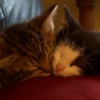probability
This is trickier than it looks and has caught out people with higher degrees in maths.
Three playing cards are shuffled (one ace and two kings). The ace is the winning card.Someone is asked to select a card but not to look at it. The dealer turns up one of the two cards he has retained and reveals it to be a king. What should the contestant do? Should he look at his own card or change his mind and switch to the dealers card or doesn't it matter? This problem is based on the prior knowledge concept. What do you think is the probability of his original card now being the ace?On the royal institute christmas lectures last year (I think) they used a version of this to help with explaining probability theories. I do not remember how it all worked out but I think the idea was that by picking a card but then changing your mind changes the probability of picking the winning card. Stick to your first choice and your chances of getting the winning card are 1/3. Changing your choice seems like a 1/2 chance but its actually not, your chances of having picked the wrong card in the first place will more often the not be what happened as it was 1/3 so change your mind and your chances are greater then 1/2 and you will win more. I don't remember what the % is if you always change your mind tho

I would say that the original probability of having an ace was 1/3.
Now that one card has been revealed to be a king, the probability increases to 1/2 due to the extra information available.
If the revealed card had been the ace, the probability would have decreased to 0.
I don't see how changing one's mind can affect the probability.In the first instance you stood a greater chance of being wrong, so 2 times out of 3 you chose the wrong card, by taking the chance to change your mind you can say up to 2 times out of 3 you are making the right choice.
well done Kirstenblog. The dealer@card becmes a2/3 chance. If the dealer started with afull pack and said the ace of hearts would be the winner.You choose a card and don't look .Your chance is 1/52. If the dealer keeps turning over cards and the ace of h doesnt turn up and he gets down to three cards, you are correct you should change because the dealer's cards are 17/52 17/52 17/52 and yours stays as 1/52.
I found this problem, strangely enough in a novel " the curious incident of the dog in the night" Although I adapted it slightly.You are not a bit of a geek. You are a well rounded individual, with many talents and I think your hubs prove this.Seriously, a lot of great mathematicians got that problem wrong.So congrats again.
Obviously I was hoping that there would be a big debate between those that thought it was a 1/2 chance and those that thought it a 1/3 chance.
However, your reply and explanation was so good that it scuppered that plan.
I can be funny as well as serious. If you read "the ultimate salesman" which is a true story, let me know what you think. I know it's not the sort of writing that makes money but I would value your opinion.
Good luck and hope 2010 is your best year ever.
you are in good company but wrong . The dealer'card becomes a 2/3 chance.
If you had 4 cards (1 ace and three kings) The two remaining dealer cards become 3/8 chance and 3/8 chance and your card remains 1/4 chance and it all adds up to 1 or 100%
Imagine 52 cards and ace of hearts is the winner. When you choose acard it is 1/52. if the dealer starts turning over the pack and fails to reveal the ace of spades and is down to three cards. You should choose one of those because they are17/52 17/52-17/52 chances and yours stays 1/52.
I adapted this from a probability problem in the brilliant novel "the curious incident of the dog in the night"Writeangled, firstly thanks for responding. The vast majority of people answer that it is 1/2 chance, including mathematicians with a PHD. So please don't think I was trying to make anyone look foolish.
I respect you for considering the problem.Your hubs are brilliant and I hope to learn from them.
SeanI have read the posts following this and I am still not convinced that you are not right RA.
When we have one card each there is a 50/50 chance - all other chance percentages are before and cease to exist in terms of the new situation.
I am c**p at maths unless it involves money but I think the example appears to apply in the new present but is in fact past and redundant.
This is similar to the "Monty Hall" problem. On your frist choice your chance was one in three (1/3) that the card you chose was the ace. That means that the chance that the ace was in the remaining two cards was two in three (2/3). When one of the two remaining cards is exposed to reveal a king, the odds are still 2/3 that the ace was among those remaining cards. It is always advantageous to switch your choice to the remaining card which has a 2/3 chance of being the ace and your original card still has a 1/3 chance.
That is totally convoluted.
If I have 3 numbers, 1,2,3 and I write them on a card and tell you 1 is the winner, ask you to pick a card but not show it.
If I flip 1 card over and its a 3, whether you change your card or not you have a 50/50 chance NOW of being right. Not at the beginning, it was 1/3 chance. Once you have more information available, it changes the odds and the outcome.
Now strictly math, you would say the original bet is still 1/3 but if you have eliminated one of the choices as wrong (not in the game) it goes to 1/2. So there is no point changing your card. You have an equal chance changing or not changing. You cannot use the original odds to compute probability AFTER you have changed the game in the middle, you have to include the new information.traderx: I know the answer seems counterintutive. The Math Forum website (http://mathforum.org/dr.math/faq/faq.monty.hall.html) has a good illustration of this problem. Also, look at the Monty Hall Problem in Wikipedia.
I've looked at this problem and I came up with eight possible outcomes which are narrowed down to just two depending upon which initial card is chosen and which card the dealer choses. Of the eight outcomes four are stay options - two of which you will win and two you will lose. The same is for the four change options - two will win and two will lose. The odds are 50:50 and it makes no difference whether you chose to stay with your card or change it.
As I see it the answer being given has seemingly skewed the odds in favour of a change of card by hiding two of the eight outcomes. The eight outcomes I calculated were
Choses Shown Then choses
A B A – stay – win
A B B –change – lose
A C A – stay – win
A C C –change - lose
B C B – stay - lose
B C A – change win
C B C –stay - lose
C B A –change win
The "trick" here, is the wording of the question. Ha-ha!
Related Discussions
- 372
nobody can deny the existence of God
by daeemomin 15 years ago
CONGRATULATING AN ATHEISTNormally, when I meet an atheist, the first thing I like to do is to congratulate him and say, " My special congratulations to you", because most of the people who believe in God are doing blind belief - he is a Christian, because his father is a Christian; he is...
- 21
How many second chances should you give?
by Susannah Birch 13 years ago
How many second chances should you give? What if the person and situation changes?
- 18
Changing to secondary account?
by LarasMama 13 years ago
I made this account before I really knew what HP was and am not too happy with the name for long term use (for one thing I hope to have lots more children!). I have a second account I'm planning to write on once I hit 100 hubs on this one. Any reason that this would be a good/bad thing to do?...
- 21
Chances To Changes— Poem by Chitrangada
by Rosina S Khan 2 years ago
Chitrangada, I loved your poems in response to Brenda's prompt, "Chance." I agree with your viewpoints and so will other fellow writers. Here is the link:https://hubpages.com/literature/Chances-To-Changes-PoemI loved the quotes too which are relevant. All in all a smart response to...











